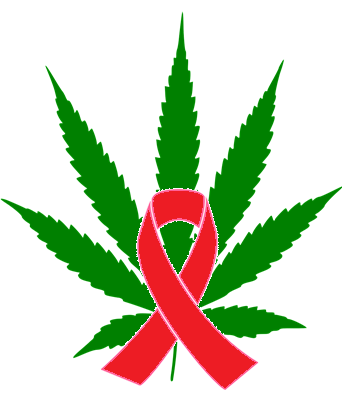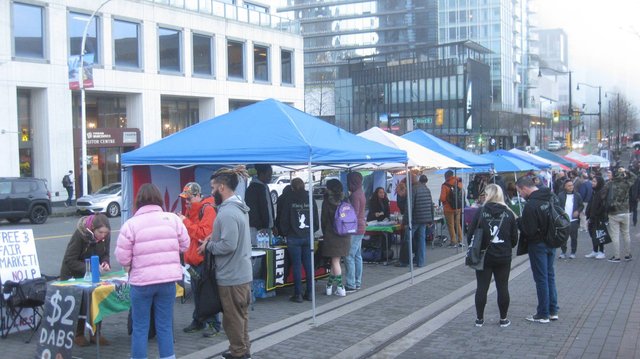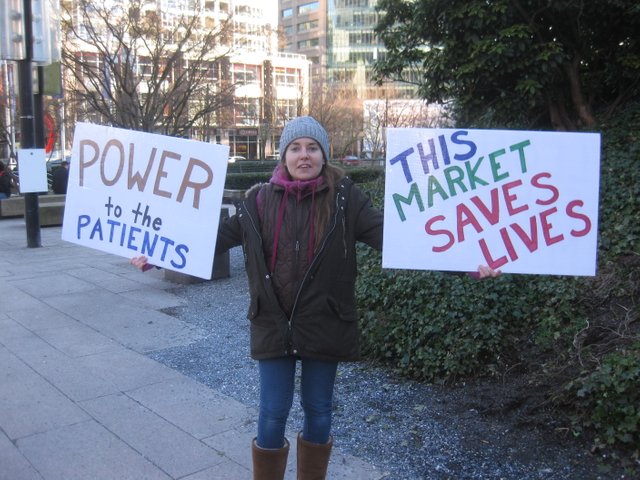But where did the money go?! In 2015, UBC professor and researcher Dr. M.J. Milloy received a million-dollar research grant to study the therapeutic effects of cannabis against HIV (8). Based on research showing that cannabis treats Simian Immunodeficiency Virus (SIV) in monkeys, Dr. Milloy discovered it has the same effect in humans!

Chronic cannabis use among HIV-positive drug users is associated with lower viral blood levels of HIV-1!

Cannabis helps HIV patients in taking their other medications, too. Unlike alcohol binge drinking (4) and other substance use (5), chronic cannabis use does not affect HIV/AIDS patients’ adherence to Antri-Retroviral (AR) Therapy (1). In other words, patients who use “hard” drugs or binge drink do not stick to their AR therapy but cannabis users do.
Cannabis also prevents or treats risk factors that lead to HIV infection. Many people who were abused as children become homeless, sometimes even before adulthood. These people are also at higher risk of becoming HIV-positive needle drug users (6); however, street youth who use cannabis don't use injection drugs as early in life compared to those who do not use cannabis (3). In other words, cannabis treats trauma and helps prevent or put off needle drug use for at-risk youth.

Dr. MJ Milloy’s research was very promising, but he no longer studies how cannabinoids treat HIV. Now that he has been bought and owned by Canopy Growth Corp (7), he focuses only on social research involving opioid and needle drug users. Although, it is still related to AIDS, it’s already being studied, so it’s a second-rate distraction from the more important and promising (AIDS) research.

Since Dr. Milloy’s AIDS research began long before Canadian cannabis legalization, it’s ridiculous that they would pretend that research is finally being conducted, but only because of legalization, and downplay how cannabis treats HIV/AIDS and prevents it by treating trauma and addiction.
“With cannabis fully legalized in Canada, researchers interested in the plant can finally undertake investigations that were previously beyond their reach, tangled in red tape. There might be no area of inquiry more pressing than the overdose crisis and claims that cannabis can be used to help some people manage, minimize, or even eliminate an addiction to opioids.”
The article goes on to reference the High Hopes Foundation which sold cannabis at a Downtown Eastside street Market in Vancouver, Canada, but they failed to mention the Vancouver Art Gallery/Robson Square 420 Farmers Market that helped addicts daily access medicine, often for free or at cost. The Market was shut down by Vancouver PD’s Project Apprentice.


Sources
Lake S, Kerr T, Capler R, Shoveller J, Montaner J, Milloy MJ (2017). “High-intensity cannabis use and HIV clinical outcomes among HIV-positive people who use illicit drugs in Vancouver, Canada.” International Journal of Drug Policy. Vol 42, pp. 63-70. doi: 10.1016/j.drugpo.2017.02.009. https://www.ncbi.nlm.nih.gov/pubmed/28336000
Milloy MJ, Marshall B, Kerr T, Richardson L, Hogg R, Guillemi S, Montaner JS, Wood E (2015). “High-intensity cannabis use associated with lower plasma human immunodeficiency virus-1 RNA viral load among recently infected people who use injection drugs.” Drug & Alcohol Review. 34(2):135-40. doi: 10.1111/dar.12223. https://www.ncbi.nlm.nih.gov/pubmed/25389027
Reddon H, DeBeck K, Socias ME, Dong H, Wood E, Montaner J, Kerr T, Milloy MJ (2018). “Cannabis use is associated with lower rates of initiation of injection drug use among street-involved youth: A longitudinal analysis”. Drug & Alcohol Review. Vol 37(3), pp. 421-428. doi: 10.1111/dar.12667.https://www.ncbi.nlm.nih.gov/pubmed/29430806
Slawson G, Milloy MJ, Balneaves L, Simo A, Guillemi S, Hogg R, Montaner J, Wood E, Kerr T (2015). “High-intensity cannabis use and adherence to antiretroviral therapy among people who use illicit drugs in a Canadian setting.” AIDS Behaviour. Vol 19(1), pp. 120-7. doi: 10.1007/s10461-014-0847-3. https://www.ncbi.nlm.nih.gov/pubmed/25012624
Socias ME & Milloy MJ (2018). “Substance Use and Adherence to Antiretroviral Therapy:What Is Known and What Is Unknown.” Current Infectious Disease Report. Vol 20(9), pg. 36.doi: 10.1007/s11908-018-06367.https://www.ncbi.nlm.nih.gov/pubmed/30066113
Walton G, Co SJ, Milloy MJ, Qi J, Kerr T, Wood E (2011). “High prevalence of childhood emotional, physical and sexual trauma among a Canadian cohort of HIV-seropositive illicit drug users.” AIDS Care. Vol 23(6), pp.714-21. doi:
10.1080/09540121.2010.525618.https://www.ncbi.nlm.nih.gov/pubmed/21390877“Dr. M-J Milloy to investigate cannabis for opioid-addiction treatment as UBC's first Canopy Growth professor.”
https://www.straight.com/cannabis/1168876/dr-m-j-milloy-investigate-cannabis-opioid-addiction-treatment-ubcs-first-canopy?fbclid=IwAR3yY5FY4jk98RgJ3nRtzUwi8kUbJzTuN25tcOe5skgvCqCubHtOM_0ZPmE“Medical marijuana: Daily cannabis use may lower HIV viral loads” http://cfenet.ubc.ca/news/forecast/medical-marijuana-daily-cannabis-use-may-lower-hiv-viral-loads
Nicely written. Lots of good cannabis research already done. Saying they had to wait for legalization is ridiculous. Trying to revise history with lies? Blockchain's on it with the #truth :D
Downvoting a post can decrease pending rewards and make it less visible. Common reasons:
Submit
True! Studies are always dated and we're putting the full versions on the blockchain whenever we can!
Downvoting a post can decrease pending rewards and make it less visible. Common reasons:
Submit
Great article, thank you for putting it together. I like your images and links too. I'd been wondering where that scientists was, and why I hadn't heard any results from his cannabis-for-aids research.
Downvoting a post can decrease pending rewards and make it less visible. Common reasons:
Submit
Yeah it was sure suspicious when it went quiet after the big announcement. We'll bring it to light like a decarboxylating cannabinoid! :)
Downvoting a post can decrease pending rewards and make it less visible. Common reasons:
Submit